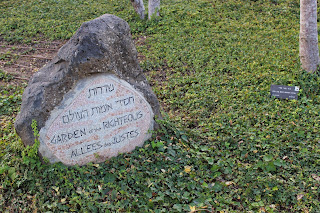The imagery of tree and fruit was regularly used by Jesus in his teaching and features in our Psalm (Psalm 1) and New Testament reading (Galatians 5.16-26) today. Jesus’ followers are chosen and appointed to bear fruit. Fruitfulness is the overall aim of the Christian life and lack of fruitfulness is to be challenged and is ultimately destructive.
Fruitfulness is a consequence of being ‘in’ Christ, as Jesus makes clear in John 15.5: "I am the vine; you are the branches. If you remain in me and I in you, you will bear much fruit; apart from me you can do nothing.
Branches can only bud and grow because they are part of the vine as a whole receiving the sustenance that flows up into the vine from the roots. Similarly, the tree by the water in Psalm 1. A vine roots in the soil but has most of its leaves in the brighter, exposed area, getting the best of both worlds. So, being rooted in Jesus is the way in which Christians can open to the light and bear fruit. Rootedness could mean commitment to Christ or being embedded in Christ’s life and ministry or both.
The Bible gives us at least two sources of help in being rooted. The first can be noted in the very first Psalm which uses the image of good fruit growing on a tree in order to say that good fruit grows in our lives when we delight in the law of the Lord and meditate of that law day and night. Regular meditation on scripture feeds our ability to better integrate our words and actions.
Our second source is found in Galatians 5 where the fruit that we are called to produce is love, joy, peace, patience, kindness, generosity, faithfulness, gentleness, and self-control. The originator of these behaviours in us is the Holy Spirit. The fruit are of the Spirit whenever and however they show up in our lives and actions.
Being led by the Spirit and regularly meditating on the scripture are the two keys to rootedness - to being ‘in’ Christ - and to a close meshing of words and actions in our lives. The Spirit is the Spirit of Jesus and the fruit which is grown in Christian’s lives is Christlikeness. Being rooted in Jesus enables the Spirit of Jesus to flow in and through a Christian enabling them to begin to become Christlike.
So, what is fruitfulness? What is it that Jesus is aiming to see in his followers? One way of answering that question for Christians, because Christianity has been a missionary faith, has been to see fruit as souls saved but when Paul writes in Galatians 5 about the fruit of the Spirit he is writing about the character and actions of Christians as fruit, rather than the outcome of our actions: “the fruit of the Spirit is love, joy, peace, forbearance, kindness, goodness, faithfulness, gentleness and self-control.”
This kind of fruit is about behaviours leading to actions. Actions speak louder than words. That proverb can be traced at least as far back as a speech made by J. Pym in Parliament in 1628 in which he said: ‘A word spoken in season is like an Apple of Gold set in Pictures of Silver,’ and actions are more precious than words.’
The proverb is, however, ultimately based on Biblical ideas and phrases such as 1 John 3. 18 where we read: ‘let us not love with word or with tongue, but in deed and truth.’ This teaching probably then derives from Jesus’ words in Matthew 7. 15 – 21, where he argues that we are known by our fruits, meaning our actions, and that simply saying ‘Lord, Lord’ without then acting on that confession is not enough to guarantee our salvation.
In the Parable of the sheep and goats (Matthew 25.31-46) Jesus emphasises that it is actions, not words, that will count in the final judgement, when he says: ‘‘Come, you that are blessed by my Father, inherit the kingdom prepared for you from the foundation of the world; for I was hungry and you gave me food, I was thirsty and you gave me something to drink, I was a stranger and you welcomed me, I was naked and you gave me clothing, I was sick and you took care of me, I was in prison and you visited me.’ St Francis of Assisi summed up this aspect of Jesus’ teaching well, when he said: ‘Preach the gospel at all times. Use words if necessary.’ So, what kind of fruit is evident is our lives?
Finally, Paul writes in 1 Corinthians 13 that such actions as faith, hope and love remain. The word he used for remain hints that such actions continue beyond the grave into eternity i.e. that we can take something with us when we die, that the fruit or acts of faith, hope and love grown in this life continue into, and continue to bear fruit in, the next. Jesus said, "I chose you and appointed you so that you might go and bear fruit — fruit that will last" (John 15.16).
----------------------------------------------------------------------------------------------------




















































